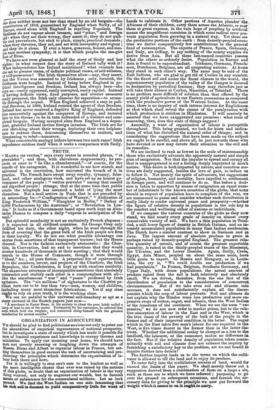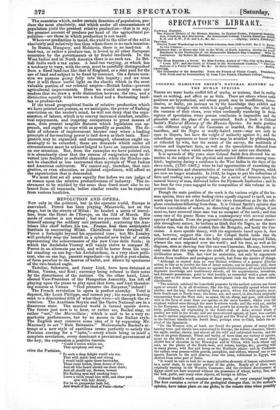ORGANIZATION IN AGRICULTURE.
WE should be glad to find politicians anxious not only to point out the absurdities of empirical regenerators of national prosperity, but to investigate a state of society which has made it possible for men of limited experience and knowledge to occupy thrones and ministries. To apply our meaning near home, we should have Men not merely sneering or laughing down the attempts of Messrs. Blanc and Albert to organize labour in France, but set- tmg themselves in good earnest the task of ascertaining andpro- claiming the principles which determine the organization of la- bour both there and here.
For it is willingly to stop one's ears to the loudest as well as the most intelligible chorus that ever was raised by the nations of this globe, to doubt that an organization of labour is the very thing wanted, not only to augment our wealth, but to furnish Means of subsistence for the accumulated millions. Let us look around. We find the West Indian on one side lamenting that his rich soil is doomed to yield comparatively little for waat of hands to cultivate it. Other portions of America plunder the Africans of their children, carry them across the Atlantic, or rear them at great expense, in the vain hope of peopling by artificial means the magnificent countries in which some radical error pre- vents population from growing in a natural way. Yet these are the productive portions of the earth : from densely-peopled coun- tries we derive comparatively few contributions to the general fund of consumption. The exports of France, Spain, Germany, and Italy, are trifling, to say nothing of the scanty supplies we derive from Asia. But all these last-named countries possess what the others so ardently desire. Population in Europe and Asia is found to be superabundant. Irishmen, Germans, French- men, Dutchmen, Belgians, are all emigrating nations. At home they stand in each other's way. The same may be said of the East Indians, who are glad to get rid of Coolies in any number. On the finest soil and under the finest climate in the world, the supernumerary population of the valley of the Ganges is doomed to decimation by periodical famines; they may therefore just as will take their chance at Ceylon, Mauritius, or Trinidad. There is no problem more difficult of solution than that offered by the scanty yield of agriculture in our Eastern possessions as compared with the productive power of the Western Indies. At the same time, there is no inquiry of such intense interest for Englishmen as that which shall reveal the causes of the paralyzation with which production is stricken in Hindostan. It will scarcely be asserted that we have exaggerated our premises : what train of reasoning, then, does this state of things suggest ? Assuredly, a want of organization of labour is perceptible throughout. This being granted, we look for hints and indica- tions of what has disturbed the natural order of things; and in considering the suggestions that have been made on the subject we ought to be careful, and above all? be just towards those who have devoted or now may devote their attention to the evil and its remedies.
We are inclined to rank as lowest in the scale of statesmanship those who exclusively advocate the apparently natural and simple plan of emigration. Not that the impulse to spread and occupy all that is unappropriated is not a feeling deeply imprinted in man's nature. This desire is both imparted by nature, and countless mo- tives are daily suggested, besides the love of gain, to induce us to follow it. Not merely the spirit of adventure, but suggestions of religion, humanity, and morality, have impelled to settlement in foreign parts, and will continue to do so. But before a deci- sion is taken to apportion by means of emigration an equal num- ber of inhabitants to the known countries of the globe, that none should in respect of population have to complain of the rest, we are summoned to pause and consider whether such distribution is really likely to confer universal peace and prosperity—whether the figure of relative density in populations is the sole key to the comfort and wellbeing either of nations or individuals.
If we compare the various countries of the globe as they now stand, we find nearly every grade of density on almost every conceivable variety of soil. We have a thin population in Trim- dad, a still lower figure of density in British Guiana, and an in- tensely accumulated population in many East Indian residencies. The Dutch have a similar contrast to show in Surinam and in Java. The largest amount of absolute produce in grain is perhaps raised by densely-peopled England. The greatest rela- tive quantity of cereals, and of course the greatest exportable quantity, is raised in the thinly-peopled tracts of the Mississipi, the Ukraine, and the Lower Danube. Again, Sicily, Crete, Egypt, Asia Minor, peopled on about the same scale, have little grain to export. In Russia and Hungary, as in Louis- iana, the cry is, " We could double our production if we had population!' In France, Belgium, Southern Germany, and Upper Italy, with dense populations, the actual amount of produce raised from the soil is both relatively and absolutely small. We are driven, therefore, from the one fact of the distribution of population to the consideration of concurrent circumstances. But if we take even soil and climate into account, it does not satisfactorily explain all the discre- pancies which the map of labour presents. Soil and climate do not explain why the Hindoo rears less productive and more ex- pensive crops of cotton, sugar, and tobacco, than the West Indian or the American of the continent. When we use the term " ex. pensive," we do not now refer to market prices, but to the rela- tive absorption of labour in the East and in the West, which is the true cause of the poverty of the bulk of the people in the former and of their improved condition in the latter. The sugar which in the East takes five men's labour for one required in the West, is five times dearer in the former than in the latter dis- tricts. Whether the additional outlay be charged as a loss to the landlord, the labourer, or the consumer, makes no difference in the fact. But if the relative density of population taken conco- mitantly with soil and climate does not exhaust the inquiry, by furnishing a satisfactory key to the problem, are we not bound to inquire further into details? The further inquiry leads us to the terms on which the culti- vator is allowed to till the land and to enjoy its produce. To enter fully into the multifarious tenures of land, would far exceed the limits of this paper. We shall merely throw out a suggestion derived from a combination of facts on a large s ale, such as those are to which we have referred ; purposing to go over the ground on subsequent occasions, and furnish the ne- cessary data for giving to the principle we now put forward the weight which it seems to us it ought to carry.
The countries which, under certain densities of population, pro- duce the most absolutely, and which under all circumstances of population yield the greatest relative production—that is to say, the greatest amount of produce per head of the agricultural po- pulation—are those in which production is not taxed. Wherever production is taxed, the yield to the tiller of the soil is absolutely and relatively less than where there is no such taxation. In Russia, Hungary, and Moldavia, there is no land-tax. A land-tax, or rather a produce-tax, is levied in all other European countries by the governments or by feudal landlords. In the West Indies and in North America there is no such tax. In Bri- tish India such a tax exists. A land-tax varying, or which has a tendency to vary, with the crop, must be carefully distinguished from a fixed land-tax like that of England, or a rent paid for the use of land and subject to be fixed by contract. On a future occa- sion we purpose going fully into this inquiry ; and we trust that it will throw useful light on the checks which in the most valuable portion of our colonial empire—British India—prevent agricultural improvements. Here we would merely warn our readers that we draw a wide distinction between the two, and a distinction equally wide between a fixed and a fluctuating land- tax or produce-tax.
If the broad geographical limits of relative production which we have pointed out possess, as we anticipate, the power of flashing conviction on the reader's mind, he will not deny that the orga- nization of labour, which is to convey increased comfort, intellec- tual enjoyments, and inspiring occupations to great masses of men, does present tangible features which legislators can ap- proach, and ought to cope with as speedily as possible. The de- tails of schemes of improvement become easy when a leading principle of far-reaching power is laid down as their basis. Emi- gration may be organized and encouraged, education ought un- ceasingly to be extended ; these are demands which under all circumstances must be acknowledged to have an imperious claim on our attention. But, from the examples we have pointed out, it is abundantly clear that the stream of emigration may be di- verted into fruitful or unfruitful channels; while the Hindoo can- not be classified as less instructed than myriads of West Indian and American cultivators. We cannot say, therefore, that emi- gration, or even education, as isolated expedients, will afford us the organization that is demanded.
We must first set all arms equally free before we can judge of or reason upon the relative productiveness of industry. The in- strument to be wielded by the arms thus freed must also be re- leased from all trammels, before similar results can be expected from various localities.



























 Previous page
Previous page